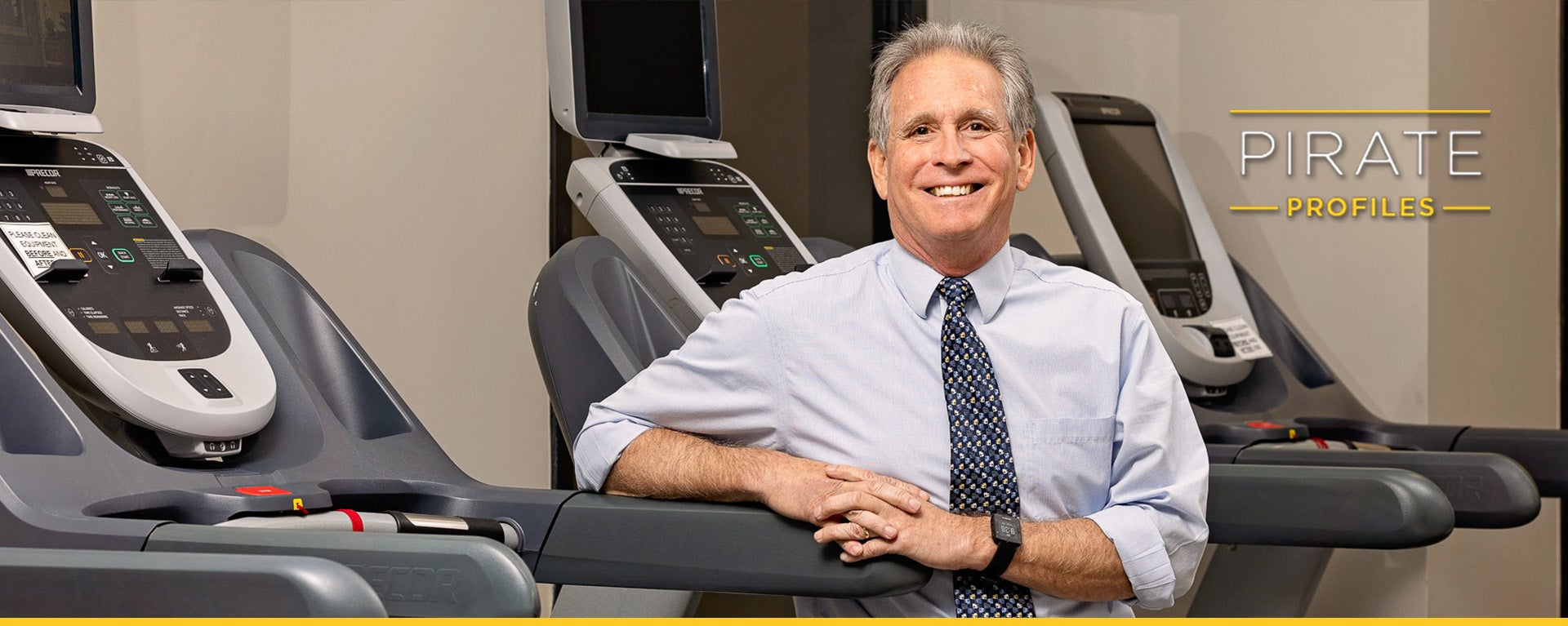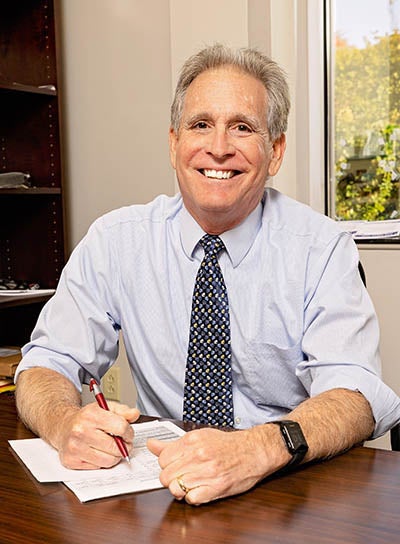Faculty: Dr. Joseph Houmard
Joseph Houmard arrived at East Carolina University in 1988 as a postdoctoral student just months after getting married.
“Kandy and I came here with the thought that it would be two or three years,” he said.
Nearly 34 years later, Dr. Houmard is still at ECU as a professor in the Department of Kinesiology, mentoring students in research that is helping shape the way we move and stay healthy.
“I interviewed at a lot of other places,” Houmard said. “Both my wife and I are from the Midwest, and that’s always home. And even though they were mostly Big 10 or SEC (Southeastern Conference) universities, nothing really beat the environment that I had here at ECU. At the time, ECU had about 10,000 students, and Greenville was limited in areas such as shopping and other amenities in larger towns. But in the long run, this has been a great place to raise our kids (daughter Katie and son Tommy). They’ve done really well going through the public school system. We have a lot of friends, and they have a lot of friends. All those important things had us stay here and get glued here.”
In his time at ECU, Houmard has seen plenty of changes, most notably with the growth of the medical campus as well as an increase in the overall student population.
“The population of the students has grown exponentially,” he said. “The health sciences have grown a lot — dental school, PT (physical therapy) school — all that has really expanded quite a bit. The Department of Kinesiology got a Ph.D. program here in the year 2000, so that changed our whole dynamic, that now we’re dealing with doctoral students not just master’s and undergraduate students. There’s been fairly high demand for our programs, which has been a good thing. That was never really there before.”
In his time at ECU, he’s mentored plenty of students, and he remains in contact with many of them.
“They’ll ask me to read a grant of theirs or maybe ask me about a career choice,” Houmard said. “I get that from several former students, but the good thing too is sometimes I collaborate with these students because they’re doing something really neat, and we can work with them on something.”
Among his research, Houmard is part of a $170 million grant funded through the National Institutes of Health Common Fund to better understand the body’s response to exercise. The goal is to understand how physical activity changes the chemical molecules within the body, which could lead to more targeted types of exercise.
ECU’s role in the multi-institutional grant is to gather blood and muscle samples from a wide variety of exercise participants. That data will be sent to other universities for analysis.
“Everybody knows that exercise is good, but what does it really do on a molecular level that makes it good?” Houmard said. “An underlying theme is that we’re going to look at young and old, and men and women. Are there differences there that could emerge that we would have to consider for gender or age? We’re also doing resistance and endurance training. One could be really good for one outcome, and one could be really good for another. I don’t think they have the same molecular signals. And no one has really looked much at what happens in fat tissue. This is looking at fat and muscle, but the biggest thing is the analyses that are being done at the Michigans and Dukes — this whole big integrated package that nobody has really used before to this extent. They’re going to look at just about everything.”
Houmard said the COVID-19 pandemic has affected the study, slowing its pace, but he anticipates data from the study in another year or two.
“Everything had to go on standstill for about a year or year and a half,” he said. “It’s just now getting back.”
Through all of his research, Houmard knows there is one thing people need to be doing to be healthy.
“Just move. That’s the biggest thing,” he said. “If you can just walk, two 10-minute segments a day or just try to do something for 30 minutes a day, it doesn’t have to make you a marathoner. You don’t have to be losing 30 or 40 pounds of weight. Just getting your muscles contracting helps in a lot of very subtle ways. Too many people exercise to lose weight, and that’s one of the things exercise really doesn’t do that well. You have to have diet, but exercise can do a lot of other stuff.”
Houmard said he draws inspiration from interacting with other ECU scientists.
“I’ve had some great mentors and collaborators,” he said. “The people who were here when the medical school started like Lynis Dohm and Walter Pories, they still have this energy and enthusiasm for it. That is what’s inspiring and you feed off of it. I could never do what they’re doing. Walter is in his 90s or so and is still working. It’s amazing.”
It’s those collaborations and the support he has received from administrators and co-workers that are behind his love of ECU.
“I’ve gotten a good amount of support over the years,” he said. “You can be skeptical and say it’s not as much as you want or things don’t always go your way, but people have given me a lot of support here in a lot of ways. When I look back on it, that’s probably one of the bigger reasons I’m here. … Any success that I have had is due to God’s plan and placing a supportive wife and family, and great faculty, staff, students and administrative assistants in my path.”
FAST FACTS
Name: Dr. Joseph Houmard
Title: Professor, Department of Kinesiology, and Director of the Human Performance Laboratory
Hometown: Akron, Ohio
Colleges attended and degrees: Manchester College (now university), Bachelor of Arts in Biology/Chemistry; Miami University (Ohio), Master of Science in Zoology; Ball State University, Ph.D. in Human Bioenergetics
PIRATE PRIDE
Years working at ECU: Arrived in 1988 for a two-year postdoc, ended up staying for 34 years.
What I do at ECU: Primarily conduct research and mentor doctoral and master’s students along with postdocs and undergrads, which is the purest form of teaching in my opinion. As director of the Human Performance Laboratory, I am responsible for the space and facilities as well as budgets.
What I love about ECU: Early on, nobody knew about ECU in my field. We spent quite a while trying to justify that we could perform the studies we presented in our grants. In that way, ECU was the underdog, and it was fun helping build up successful programs.
Research interests: Exercise in relation to its effects on conditions such as obesity and aging.
What advice do you give to students? Show up on time and you will be ahead of 90% of the people out there. Remember, the goal of your education is to get a job — and your first job does not need to be your last. Just get one.
Favorite class to teach: KINE 6207, exercise physiology for graduate students.
QUICK QUIZ
What do you like to do when not working? Go boating, fish and run.
Last thing I watched on TV: Rock and Roll Hall of Fame inductions.
First job: Paperboy for the Akron Beacon Journal.
Guilty pleasure: Listening to rock and roll played loudly (only when my wife is not in the house), attending pub runs and eating cheese.
Favorite meal: Pretty much any type of taco.
One thing most people don’t know about me: I am Hispanic — my mom is from Bolivia.

